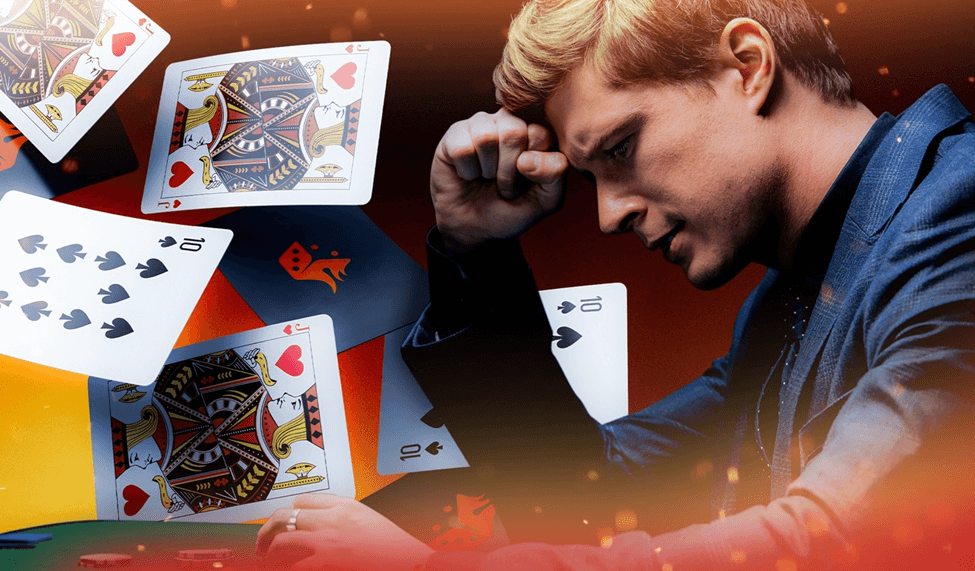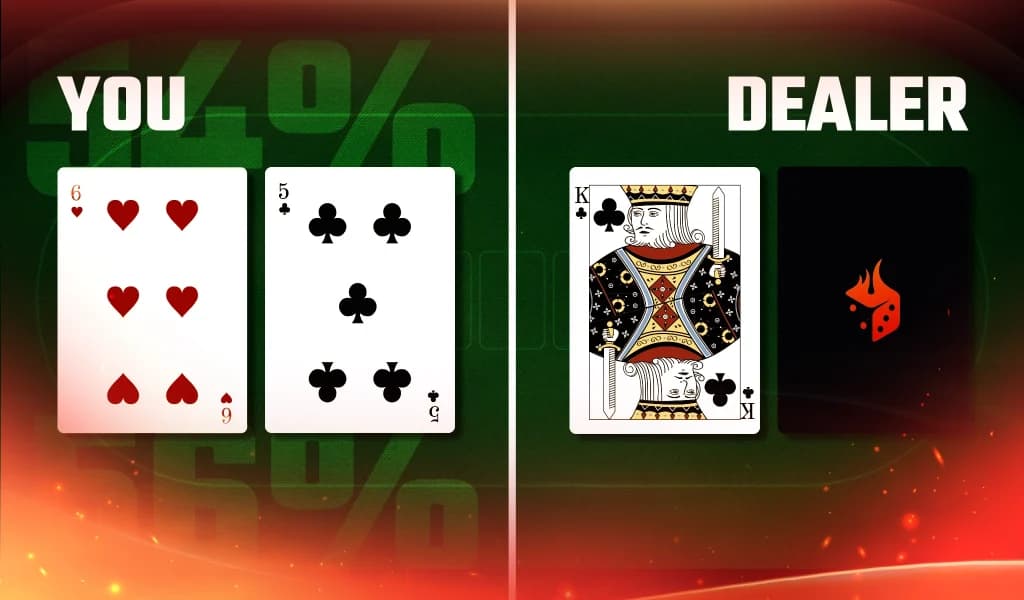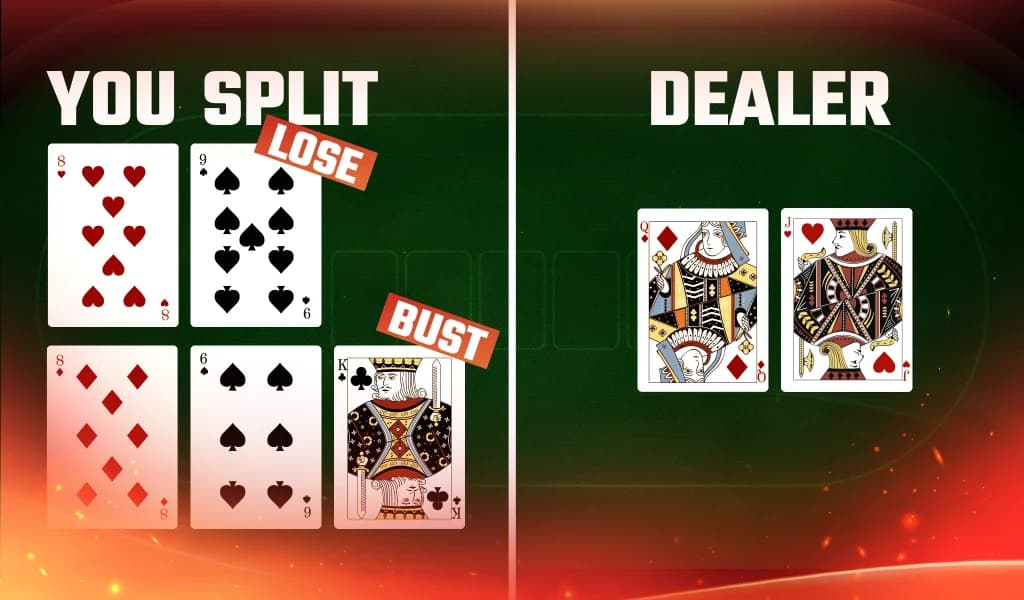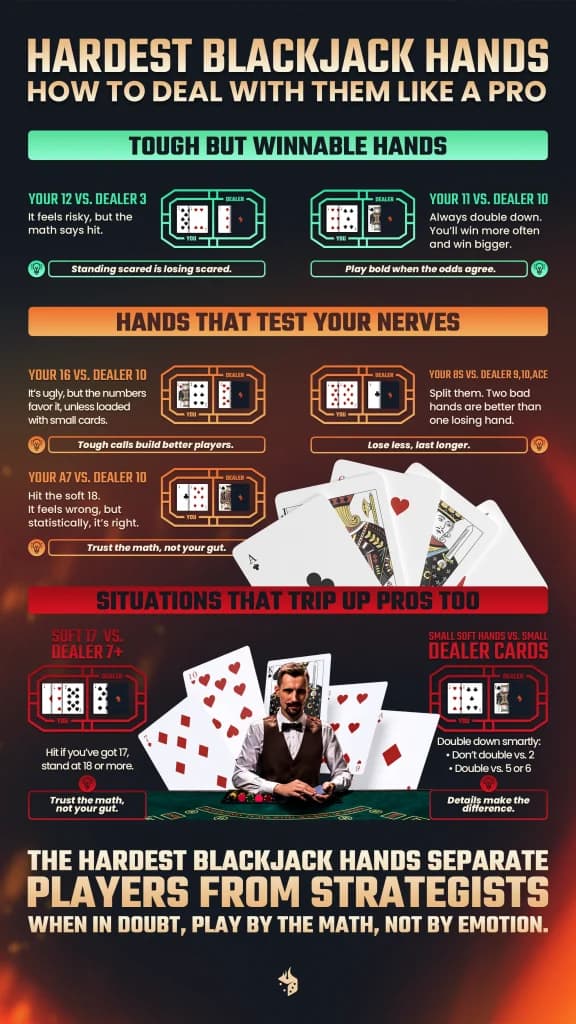
Blackjack is an exciting game with one of the lowest house edges available in the casino. But every player is forced to confront many challenging hands that can cause serious problems and harm long-term profitability if not addressed correctly. That’s why we put together this video on how to deal with the hardest blackjack hands.
Your 12 vs. Dealer 3
When you’ve got 12 and the dealer is showing something low, you might be advised to take a hit. The problem is that all those face cards and tens will make you go bust, so hitting doesn’t seem appetizing. The odds still favor it, though. 9 of the 13 cards won’t bust you. In fact, five of them will put you in the solid 17-21 range. Standing at a 12 is just not going to cut it in the long run. Playing scared is often a recipe for losses in the gambling world, and standing at 12 is as scared as it gets. Don’t do it.
Your 11 vs Dealer 10
When you’ve got an 11, it might seem like the only thing you need to consider is that you’re a single card away from 21 (which you are, but the strategic analysis doesn’t stop there). But the probabilistic math actually favors doubling down. That is, you’ll double your initial bet and will receive exactly one more card.
Why?
If you don’t double down, you have a 54% chance of winning. If you DO double down, your chances increase to 56%. The kicker is that you stand to win twice as much. You get a better chance to win and score an even sweeter pot. You really can’t argue with that.

Your 16 vs Dealer 10
16 is always annoying, but you need to simply deal with it and move on to more exciting hands. Some blackjack strategy cheat sheets would have you surrender here and cut your losses. Surrender isn’t available in every blackjack variation, though. So, how do you play it when you are forced? Believe it or not, take that hit.
Yes, really.
The odds favor this action, unless you have a collection of small cards. In that case, you can stand. The upside of hitting 16 occurs when you receive a small card. If you’re sitting on 4 of them already, the strategy shifts incrementally to favor standing.
Your 8s vs Dealer 9, 10, or Ace
Getting a pair of eights is an escape from the obligation to play a 16, which is simply a losing hand in the long run. When you split, you’ve got two fresh hands that you can play out, hopefully with better results than playing the hand combined.
Is it great to play 8s? No. But it outperforms playing a 16. It’s not a positive trend, but it loses less in the long run. Gambling is sometimes about loss minimization, and splitting 8s is a definite example of this principle.

Your A7 vs Dealer 10
The soft 18 looks good. Many people are standing on this. There’s a problem over on the dealer side, though. The chance that it will make 20 or 21 is definitely there. For this reason, when you run the numbers, you’ll find that hitting is favored. The ability to make a better hand is what really shifts things. Dealer 10s are just too fearsome, and the power to beat you is too significant to ignore. Follow the statistical approach and use the right strategy.
Hit the soft 18, even though your gut is telling you it’s totally fine. Many times, it will be, but in the long run, you’ll be kicking yourself if you don’t stick to correct optimal blackjack.
Soft Hands with 3 or More Cards vs Dealer 7s
This is a bit of a revision to the last section. The rule here is to hit your soft 17 made with 3 or more cards, but stand when you’ve got 18 or more. If the dealer also is showing strength (e.g., 9, 10, or ace), now you need to hit to stay ahead mathematically.
Small Soft Hands vs Small Dealer Card
If you have an ace and a 2, for example, you need to first consider doubling down. Here are the rules to follow:
- Don’t double against a dealer 2.
- Double against dealer 5 or 6
- If the dealer has a 3 or 4, add your kicker and the dealer’s card. If you have 9 or more as a result, double down. Sorry for the complication, but this is how to play perfect blackjack. You’re going to make more money that way.
- Oh yeah, ace-four against a 4 is a doubling situation. Exceptions to exceptions are how pros eke out profits over the course of many sessions
Continue Researching
These topics bear some dedicated study. If you really want to be a blackjack crusher, you need to commit to really learning the finer points of optimal blackjack strategy. For an experienced pro’s take on these issues, check out this 35-year blackjack teacher’s best advice.



